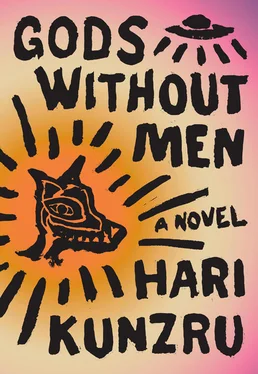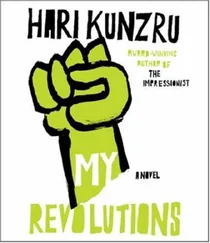So Schmidt headed south, and though he tried to tough it out, told the story to men he worked or roomed with like it was some kind of joke, the guilt grew on him until it blotted out all happiness and he knew he’d kill himself unless he did something to get back right with the world. I’m just scum, he’d say to anyone who’d listen. Can’t help it, always been that way. And he thought he always would be, thought it was impossible to change, until he found out that impossible is a word found only in the dictionary of fools , which was a quotation, his first, the second being If you gaze for long into an abyss, the abyss gazes also into you , a saying he picked out of an old copy of Reader’s Digest and which gave him the notion, foreign to him until that time, that you could find truth in the written word. Thereafter he made a habit of seeking out such written truths and copying them down, first on scraps of paper, then in notebooks, until finally he realized he was working toward a system, such an understanding of the world as very few possessed. He read as much as he could, devoured books in every spare minute of his day, and never again touched liquor until Davis persuaded him into it, and only then out of some momentary wish to be like other people, a right he knew deep down he’d forfeited.
Davis listened to his story without saying a word. It was several weeks before he visited again.
Schmidt busied himself with signaling and watching the sky, plowing the furrow he’d started with those few scattered quotations. His search had led him first to the Bible, and then other books. He always suspected that any valuable truth would be hidden, that unless you had to dig for a thing, it wasn’t worth possessing. A year or two passed, and he’d found himself in Seattle, pushing a mop around the inside of a T-hangar as engineers worked on aircraft whose size and complexity seemed like a miracle. Watching the great machines take off and land, the way the Earth relinquished them and gently welcomed them back, he felt that here was the secret made manifest. He decided to become a pilot, but when he went for a sight test, they told him he was astigmatic. That route was closed.
He went to the office and asked how to get a job as an aircraft mechanic. Technical school, replied the manager, and soon Schmidt was taking classes during the day and working nights as a security guard. By the time the war in Europe started, he had a steady job at Boeing Field and a bungalow full of books, their margins blackened by his spidery writing. The shape of his project was becoming clear: how to connect the mysteries of technology with those of the spirit. He knew the aircraft he worked on — with their tangled skeins of electrical cable, their hydraulics, their finely calibrated gauges that monitored fuel levels and engine power — were only half the story. There were forces greater and more intangible than thrust and torque and lift. It had fallen to him to unify them. Perhaps when he was brought before his maker, he would be judged not as a monster but as a bringer of light, a good man.
After Pearl Harbor he was reassigned to the XB-29 project, rushing out a new long-range bomber for use against the Japanese. The schedule was punishing. The aircraft had all kinds of problems, overheating engines, mysterious electrical faults that took days to trace. One day a test pilot lost control of a prototype, crashing through a power line into a nearby packing plant. The ground crew jumped into trucks and cars and drove toward the burning building, trying to get close enough to the wreckage to see if anyone could be saved. Thirty people died.
The engine problems wouldn’t go away, and once the bomber went into production just about every part the plants churned out was defective. The generals wanted the planes in China to start operations, but on the date they were due to leave, not a single one was ready. Schmidt was posted to Wichita, working double shifts in a snowstorm, overseeing a crew performing final mods on the navigation system. They had to turn around every twenty minutes, because that was the longest anyone could stay outside before frostbite set in. At last the planes started flying east, only to be grounded in Egypt when the engines, which had more or less worked at freezing point, started malfunctioning in the hundred-and-twenty-degree heat. Schmidt was sent out to retrofit new baffles and a cooling system, designed more or less on the fly by a team working out of a hangar at the Cairo airfield.
The B-29s limped on; Schmidt went with them. Cockpit temperatures climbed to a hundred and seventy, then fell to minus twenty over the Himalayas as the airframes were tested almost to destruction by violent downdrafts and side winds that threw the giant planes around like balsawood toys. He peered through the clouds and caught glimpses of valleys and gorges, rivers, villages, every so often the bright unnerving gleam of aluminum wreckage on the black mountainsides. Something protected him, and a week after flying over the hump he was standing on the tarmac at Hsinching. Peasants straightened up from their paddies at the airfield’s edge, shielding their eyes to watch ninety bombers of the 58th Wing take off on their way to the Showa steelworks in Anshan. He was almost hallucinating with tiredness, having spent the previous forty-eight hours field-modding the big Wright Cyclone engines, trying to stop the cascade of horrors that unfolded when things went wrong in midair: valve heads flying off and chewing up the cylinders, tiny leaks of hydraulic fluid that could prevent the pilot from feathering a stalled prop, so that it started to drag and then sheared off, or worse, seized up the whole engine, which then twisted right out of the wing. The planes looked like huge white birds, like angels. He felt a sort of queasy elation. He was atoning; he was helping win the war.
In early ’45 they moved forward operations to the Mariana Islands. On Guam, Schmidt spent his breaks sitting in a deck chair by the enlisted men’s mess at North Field, reading Isis Unveiled in an edition he’d bought from a Theosophical bookshop in Calcutta. Beyond the perimeter, out in the jungle, were wild animals and half-feral Japanese who’d been stranded when the Imperial Army evacuated. He, on the other hand, was out in the open, in the clear. For the first time in years he allowed himself to feel happy. He heard from aircrew about the incendiary raids, and somehow that didn’t touch him, but then he was transferred to Tinian. The 509th Composite acted like they were the second coming, strutting around as if they owned the whole Pacific and everyone else ought to pay them for the privilege of using it. Rumor was they were testing some new superweapon; as he watched the Enola Gay take off for Hiroshima, Schmidt knew it wasn’t carrying the standard payload, but that was all. Like the rest of the world, he found out through pictures: the burned children, the watches stopped at 8:15. His beautiful gleaming aircraft, the harbingers of light, had been used to unleash darkness. He’d been betrayed.
By the fall of ’46 he was back in Seattle but couldn’t settle into the routine of civilian work. The world seemed to be sliding toward some terrible new evil. The spiritual promise of energy had been perverted: Instead of abolishing poverty and hunger, atomic power would turn the planet into a wasteland. Unable to face going outside, he began to neglect his work. The bungalow was cold and damp. In the evenings he sat in front of the fire and shivered until he fell asleep, imagining the tall conifers outside the window closing in and blotting out the sky.
He quit before they could fire him, withdrew his savings from the bank, packed his library and his papers into his ’38 Ford pickup and headed for the desert. In his mind he saw himself as one of the prophets of old, an ascetic sitting cross-legged in a cave. He would mortify his body, purify his mind. The world had split in two, either side of the Iron Curtain. He would heal the wound. His intention was to summon the only force powerful enough to transcend Communism and Capitalism and halt the cascade of destructive energies. Since the dawn of history there had been contact with extraterrestrial intelligences. Ezekiel’s wheels within wheels, the Mayan space pilots, the cosmic weaponry of Vedic India — the visitors possessed a spiritual technology far in advance of the crude mechanisms of earth science. It was time for them to manifest themselves, to intervene in the lives of men.
Читать дальше












